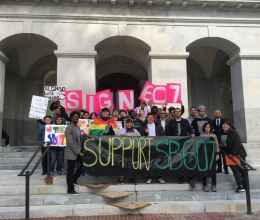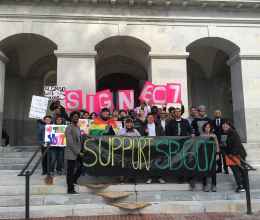As the new school year begins, students, teachers and parents are settling into old routines. But many people don’t realize the new school year also marks the beginning of a crucial, education planning process that deserves everyone’s attention.
The Local Control Accountability Plan, better known as LCAP, is a document developed every fall by every school district in the state to plan spending and other priorities for the following school year. The LCAP was established in 2013 under a state law called the Local Control Funding Formula (LCFF). This landmark legislation created a funding mechanism for California’s public schools to promote student achievement equity by directing more resources to high-need – defined as low-income, English learner and foster youth – students.
The plan is supposed to explain exactly how the district will use its funds to improve annual goals and services for high-need students. It also measures student success based on specific metrics across eight priority areas.
Unfortunately, many school districts don’t provide enough details on how they plan to spend their resources to meet their goals. The ACLU of San Diego & Imperial Counties recently described how the San Diego Unified School District’s (SDUSD) LCAP failed to meet basic requirements.
One of the main concerns the ACLU and community stakeholders, such as the Association of African American Educators, share is that many school districts fail to meaningfully engage parents, students and others in the LCAP process. SDUSD is among those districts that have fallen short of this commitment.
Community input is important because parents, students and stakeholders can use the LCAP process to advocate for funds to meet their specific school site needs, such as additional counselors, programs and tutors.
LCAP development guidelines are standardized throughout the state, but each district implements them differently. Even so, all California school districts must meet certain requirements in developing their LCAP.
Districts must:
- Engage all stakeholders. Every school board must “consult with teachers, principals, administrators, other school personnel, local bargaining units of the school district, parents, and pupils in developing a local control and accountability plan.”
- Establish Parent Advisory Committees. Every district must have a Parent Advisory Committee (PAC). If the district has 51 percent or more English learner students, the district must also establish a District English Learner Advisory Committee (DELAC). The superintendent must present the draft LCAP to the PAC and DELAC for review and comment and must respond in writing to comments submitted by the committees.
- Provide Opportunities for Public Input. Every district superintendent must provide an opportunity for members of the public to submit written comments about LCAP or its annual update. Every school board must hold at least two public meetings. The first must be a hearing to solicit comments and recommendations from the public.
- Adopt the LCAP at a Public Meeting. After hearing public comment, the school board must adopt the LCAP or annual update, and the district budget at the second public meeting.
- Align the LCAP with School Site Plans. The district must ensure that the LCAP identifies and incorporates school-specific goals from instructional spending plans created by School Site Councils, which are school-level bodies consisting of parents, teachers, students and classified staff.
These are the minimum requirements required by law. It is up to local communities to ensure their district’s spending plan is in line with the priorities of local parents, students and stakeholders alike.
In October, the ACLU of San Diego & Imperial Counties will host a forum to more fully describe the LCAP process and to inform parents and stakeholders how they can build and strengthen equity in schools. Our goal is to encourage parents to get more involved and to equip them with critical information, so they can provide meaningful input throughout the drafting, adoption and implementation of the LCAP.
If you are interested in attending this forum and would to receive updates on the ACLU’s education equity efforts, contact Chloe Triplett via email at ctriplett@aclusandiego.org.
Chloe Triplett is a Policy Advocate for the ACLU of San Diego & Imperial Counties.





